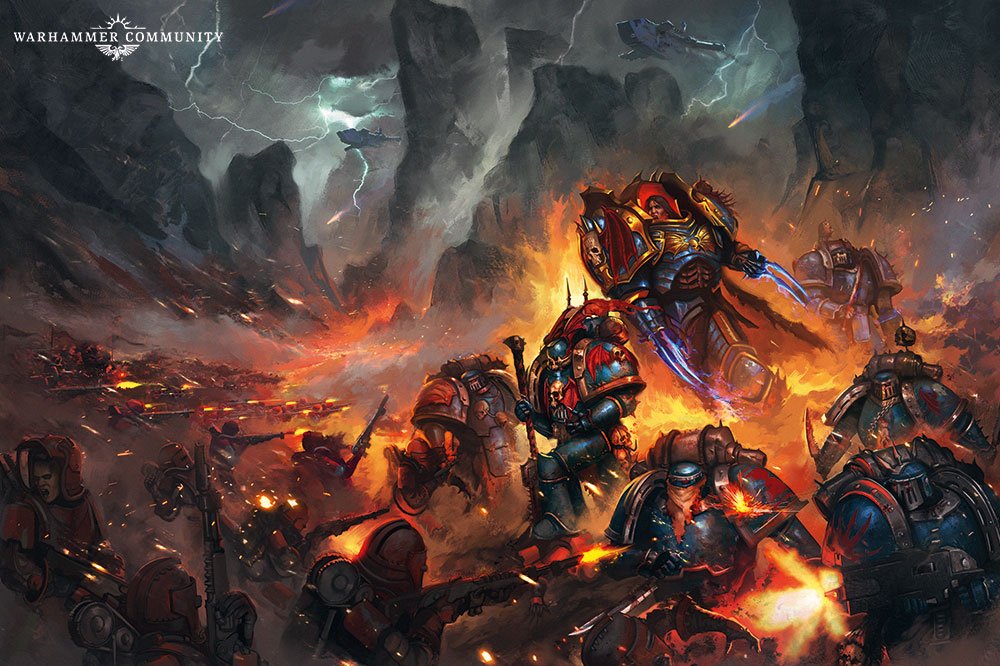
Welcome, 40K fans, to a series of articles I am writing about some of the deeper aspects of Warhammer 40,000.
These articles are a thought exercise, and by writing them I hope to improve my thinking about 40K and its fiction (and maybe about much more). Topics in this series will be wide-ranging and will not shy away from moral or philosophical issues that some may consider sensitive or even controversial. I would rather risk the conversation, so while you or I may not agree, I look forward to hearing why. Consider yourself warned for lore spoilers as well. Also, check the Tactics Corner for more great articles on gaming in 40K!
Finding Some Meaning
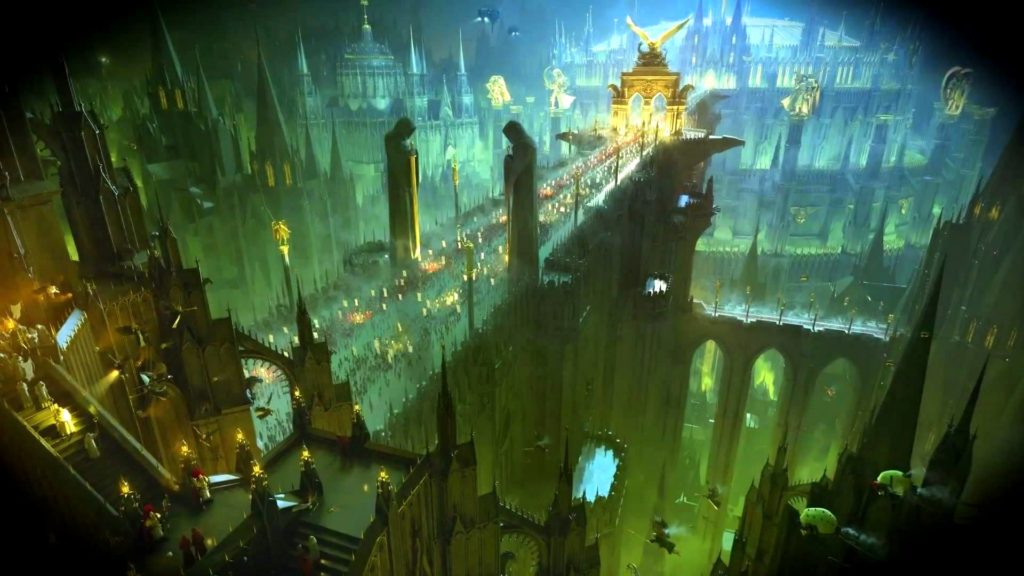
On some level, we as an audience brush over and accept without thinking that sure, there must be some acts of good here and there in the 40K universe, but they don’t amount to much. 40K, is, after all, deliberately crafted to be an awful mix of the worst reality anyone could imagine. I sit and write this in isolation at home amidst the outbreak of a global pandemic and economic collapse, but I’d still rather be here than in the 40K universe. I think that’s pretty sensible, particularly as my effective role as professional scribe would mean that I would get a pretty menial job and be likely indentured as some kind of cog in the Imperial bureaucracy, and I hate bureaucracies in the same way that Angron would hate a spa day.
Tangents about despondent imaginings of my 40K self aside, I didn’t write thousands of words and do research for part 1 of this series without an idea of why good existing in 40K is important and meaningful, despite the darkness that surrounds it. I want to be clear that I’m not trying to rose-tint the grimdark. I don’t have enough cognitive dissonance in me to attempt an escapade such as arguing that the grimdark was secretly some kind of utopia. Instead, I’m trying to pull something valuable and applicable to me (and perhaps to others) out of these stories, because amidst the firefights and melee there is useful meaning in 40K’s themes. One of those useful, meaningful things is the simulation of a journey to utopia gone wrong. It is a lesson about moral relativism and the cost of an “ends justifying the means” mentality.
Subjectivity and Moral Relativism
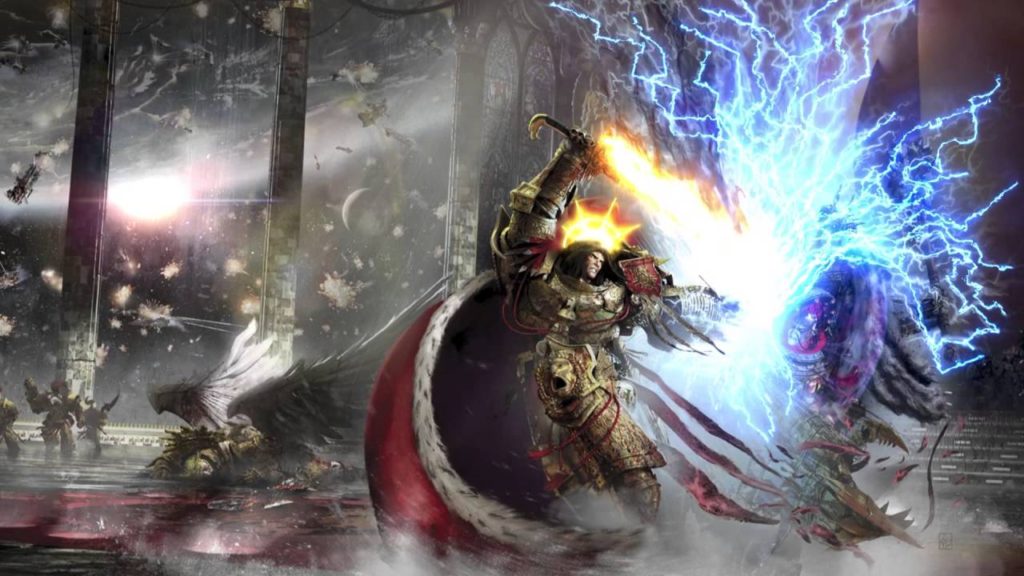
Moral relativism is a plague on higher thinking. The idea that what is “good” or “bad” is solely a matter of perspective makes very little sense, and does nothing useful for people. Just because moral relativism isn’t useful doesn’t mean that it doesn’t have some compelling arguments, however. If good is good, why don’t we just know it or act it out? I think more about a scarier question. If bad isn’t real (or if bad is matter of perspective) then nothing a person can do makes them a bad person except as matters of opinion. Admitting that right and wrong are matters of perspective means that all that I have to do to get away with making you suffer is to do it in such a way as to either not let others find out about it, or convince enough others by whatever means that what I do is at least acceptable just because that’s a matter of perspective. I’d wager there are not many who could read something like that and think that a person acting that hypothesis out in the world is an admirable person, even if they couldn’t articulate exactly why they felt that way.
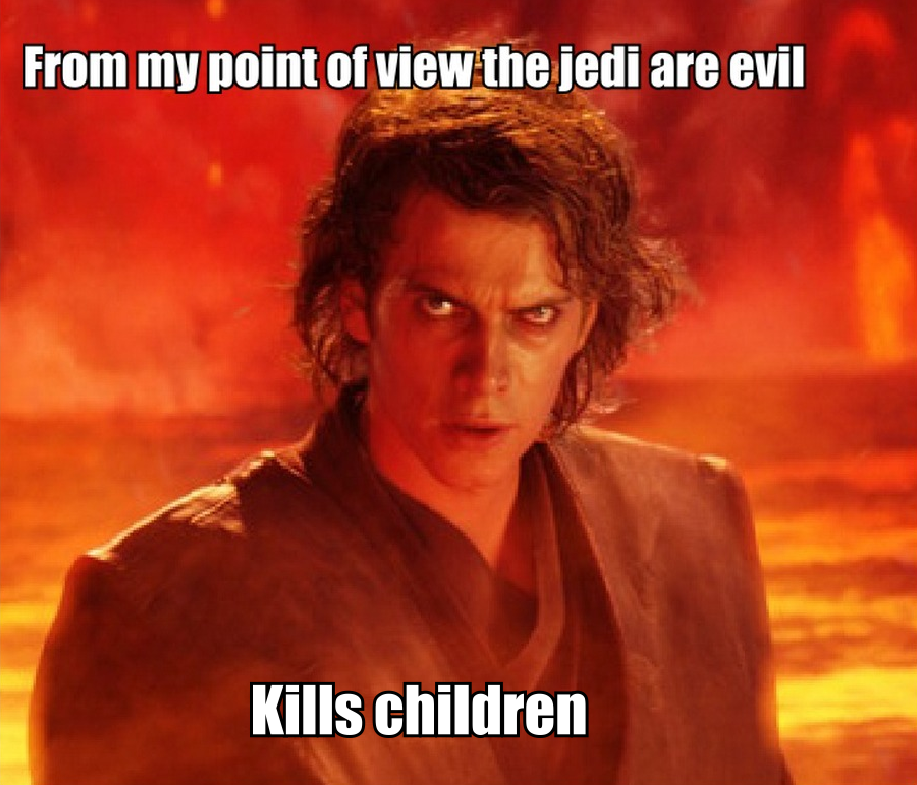
Moral relativism makes morality a matter of desires, and whether you look at the Western Judeo-Christian ethic or the Daoist/Buddhist/Shinto traditions, the concept of existing only to live out personal desires has never been a desirable outcome for individuals or societies. These systems have had myriad ways to cultivate discipline through the rejection of impulsive desires or the deliberate denial of material needs. Beyond ancient religious codes or ethics, even modern science and psychology points out that there are certain modes of being that produce better results than others, such as a lifestyle of discipline that comes from the denial of desires. Discipline being a path to personal growth and a manifestation of individuation.
In this, at least, there seems to be some consensus between religion and reason, despite reason’s attempts to undo religion. I’m sure you as the reader have your own favorites in this debate for a variety of reasons, but I’m not looking to settle the religion vs. reason war with this article. Instead I point it out as a theme that 40K wrestles with, and I am more interested in the act of wrestling itself than any particular final resolution so far as this discussion is concerned. In that spirit, let’s imagine an outcome. If reason were, somehow, to completely and unequivocally destroy religious thinking and determine morality to be a matter of perspective and desire, could mankind survive such a revelation? I am not the first to ask this question and consider the consequences, and am certainly not the smartest.
The “Death” of God
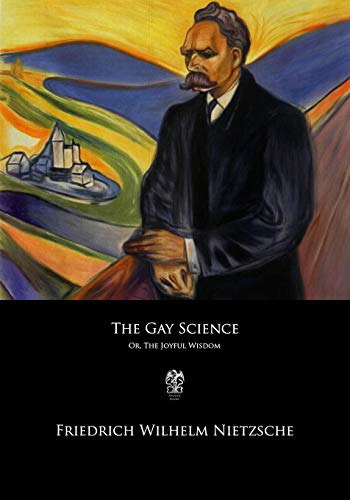
Nietzsche hypothesized that the rise of reason and thinking among mankind led to the death of God. The famous saying “God is dead” is a favorite among intellectuals and edgelords alike as they revel in what they consider the death of useless belief in a higher power. While Nietzsche, an atheist and avowed critic of religious institutions, did say that god is dead, he didn’t say so as an expression of triumph.
“God is dead! God remains dead! And we have killed him! How can we console ourselves, the murderers of all murderers! The holiest and the mightiest thing the world has ever possessed has bled to death under our knives: who will wipe this blood from us? With what water could we clean ourselves? What festivals of atonement, what holy games will we have to invent for ourselves? Is the magnitude of this deed not too great for us? Do we not ourselves have to become gods merely to appear worthy of it? There was never a greater deed – and whoever is born after us will on account of this deed belong to a higher history than all history up to now!’ Here the madman fell silent and looked again at his listeners; they too were silent and looked at him disconcertedly. Finally he threw his lantern on the ground so that it broke into pieces and went out. ‘I come too early’, he then said; ‘my time is not yet. This tremendous event is still on its way, wandering; it has not yet reached the ears of men. Lightning and thunder need time; the light of the stars needs time; deeds need time, even after they are done, in order to be seen and heard. This deed is still more remote to them than the remotest stars – and yet they have done it themselves!’”
Section 125 of The Gay Science, Nietzsche
To summarize this, the madman portrayed here realized that by killing the source of a transcendent morality, we (humanity) had freed ourselves from morality itself, and that the dire consequences in the form of moral relativism and nihilism’s fruits, would come slowly to humanity’s awareness. The madman breaking his lantern – breaking something that gives light (a symbol of guidance, knowledge, and enlightenment) – in frustration at no one realizing the significance of the death of God is very telling and deliberate in this narrative. If an atheist widely regarded as a great thinker the world over is giving you reason to feel caution about the ramifications of life without a transcendent morality, then you’ve got something to stop and consider for a moment. When you throw this idea into the 40K simulation and let it run a few cycles, you come out with a few interesting paradoxes that I want to touch on here. Many of these are driven from occurrences and observations of our own world history.
Will to Power
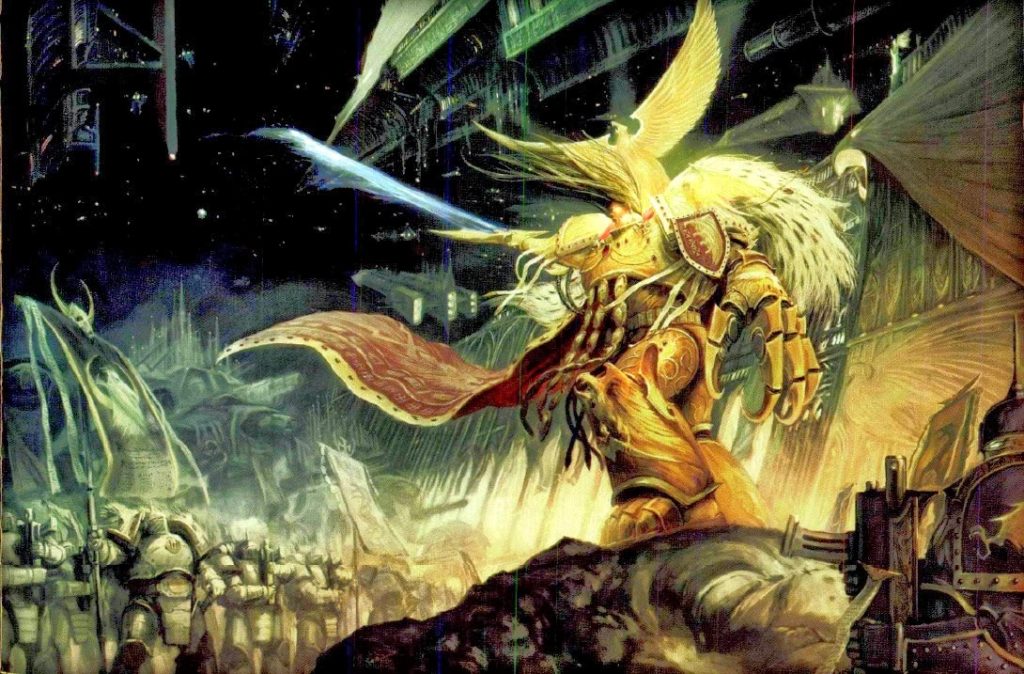
The rise of reason without morality led to a lot of suffering in our world, as Nietzsche predicted. Without a transcendent morality, morality became a matter of a strong will exerting its desires upon other wills. This ties into the “Will to Power” idea that Nietzsche spoke of as an inherent mechanism in humanity’s psyche. While Nietzsche’s goal of Will to Power was as a way of unifying and directing human ambition for the good of all humanity, his idea has been taken and twisted by many people and regimes throughout history to disastrous effect (as evidenced by some of the larger scale secular tyrannies of the 20th century). If anyone in 40K (or anywhere) represents a negative interpretation of “Will to Power” then it would be the Emperor of Mankind, the most intelligent and amorally rational example of moral relativism and ends-justify-the-means that perhaps has ever existed in fiction. I am going to make the case that it is exactly those traits that led directly to the Emperor’s downfall.
The Emperor has/had a dream for humanity throughout the 40K narrative. It is a bold, utopian dream divined from the desires of who is written to be the most capable, intelligent, powerful, and determined human ever to exist in this universe. This dream would, if successful, free humanity from the predations of the powers of Chaos forever, by providing for the possibility that humanity could be directed to or evolve into something transcendent and like unto himself. This aim is a good aim. His methods were not good, even if at some points they were extremely effective – effective enough that the Chaos powers imagined the Emperor to be the greatest threat to their existence. After all, if everything happened according to his plan, then the end result would be a free, transcendent race and the defeat of Chaos. That also seems like a good thing, but to accomplish his goals the Emperor ignored right and wrong, doing wrongs in the name of his “right.” As the story lays out, he enforced his will to power with the incredible competence that a being of his capability could manage.
The Road to Hell
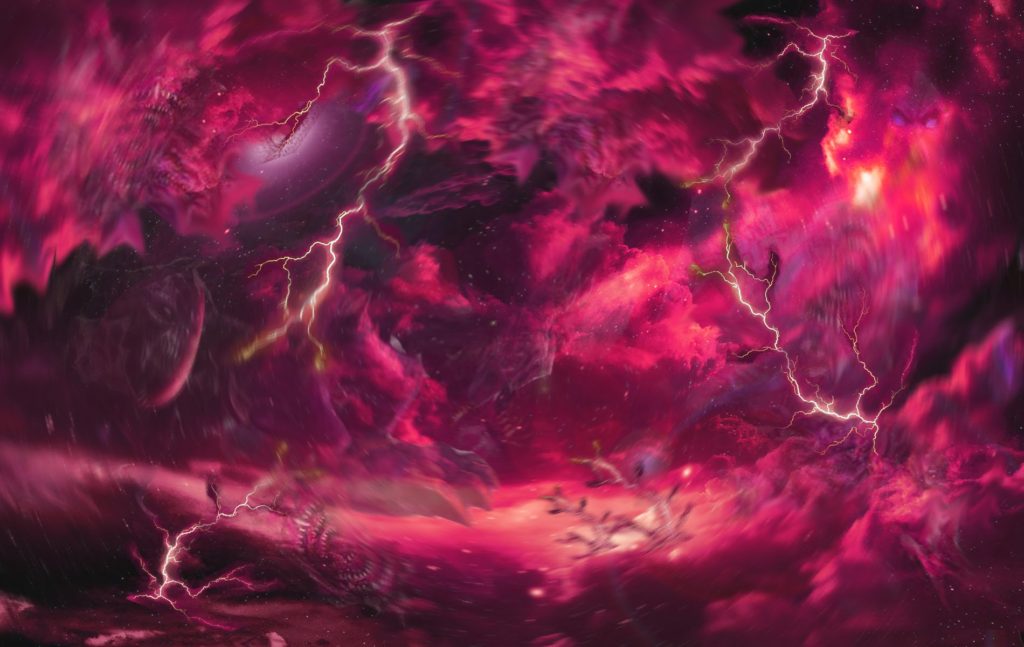
The Emperor’s aim was built upon lies (either deliberate or of omission), genocide, and destruction of all opposition by whatever means were expedient. Credit where credit was due, not all conflicts and compliances were done by the sword, but all were done at least with the will to use the sword if necessary. To embrace what the Emperor did as the correct thing because of his aim requires an admission that to perform acts such as those he committed in the name of an aim (no matter high or low) is not bad. That same logic was applied to some of the worst genocides and tyrannies perpetrated on humanity during the 20th century. Hitler’s Third Reich had an aim and a will to power that earned him a cliched reputation for evil (cited with or without justification by the generations that followed his death) as part of a war that killed 3% of the world’s population at that time. The legacy of Stalin’s will to power nearly led to the nuclear destruction of our world, not to mention the millions of his own people who suffered and died in terrible ways. Both regimes aimed for a utopia and were willing to cross previously established lines of morality, because after all, if morality is a matter of perspective then there would be nothing inherently wrong with what they did, right? The Emperor is much the same, and despite the audacity and loftiness of his aim, it is so hard to get past all the wrong he was doing to get there, as well it should be.
This is where we get into the preposterous satire of moral relativism that is the purported motivation for the traitorous enemies of the Emperor. While his wrongs form the primary justification for their rebellion, that justification (among all the others) for their atrocities in grimdark fiction fall flat under any real scrutiny. “The Emperor lied, murdered, and killed his way across the galaxy to get what he wanted, so why can’t we do the same? Except, let’s dial it all up to 13.” The motives here for the characters are pretty clear – “I’m justifying my worse thing because the Emperor or his servants did a bad thing, and since no one is a “good guy” in 40K I’m just going to pretend like the sacrificing the souls to malevolent entities and the deliberate and malicious magnification of the terror/suffering of mankind and all life in the universe in the name of absolute evil is just fine.” I am willing to accept that pure good and innocence is hard to come by in the grimdark, but that doesn’t mean that I’m going to countenance the idea that what those aligned with Chaos do is fine because it’s all just a matter of perspective. Can anyone really justify this point of view and make a claim that it is equally as valid as any other perspective? No. Chaos is wrong. Its adherents are wrong. No wrongs done by the Emperor justify the evils wrought by the unrestrained malice of Chaos and its champions. While they are both wrong, Chaos is much, much worse by every standard of examination. If the traitor legions truly wanted to rebel and demonstrate a right to rule, they would have done better than the Emperor, not worse. Instead, they just pretended to replace the Emperor’s will to power with their own, when in reality they became slaves to things much more malevolent.
The Failure of Perspective
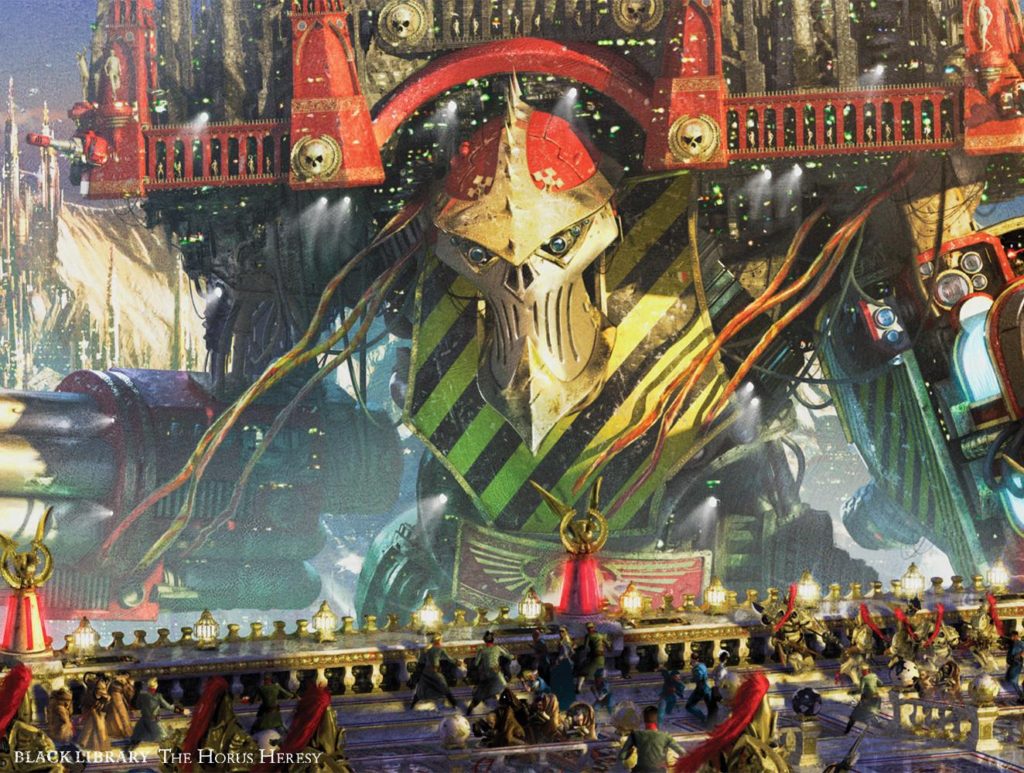
So, the Emperor is literally the avatar of a modern moral relativist with ‘good’ intentions, except built to be nigh-impossibly intelligent and far-seeing to the highest peaks of exaggeration that only 40K can climb. Even authors in the Black Library don’t write from his perspective because it would be impossible to write convincingly the level at which such a being would operate and think. Keep in mind, they do write from the perspective of aliens such as the Eldar and the Orks, but not the Emperor. That is the unreachable pedestal of majesty that he is supposed to represent. As such, it is worth considering the lesson staring us right in the face, that even with the supernal gifts and powers of the Emperor, he – the supreme avatar of moral relativism and reason – failed so profoundly that it caused 10,000 years of suffering and decline while he himself is locked immobile in an eternal battle with the unbridled forces of hell incarnate, slowly watching his dreams unravel and his shot fall short of his aim. His deeds, justified as some could argue them being in the name of his goals, ultimately ended up strengthening the foes he intended to vanquish. His means justified his ends.
What lesson is there in this? What meaning? Perhaps it means that we humans can’t imagine even the most outlandishly competent, intelligent, and powerful human being able to create a road out of lies, blood, and desire that would reach a utopia, even if it were paved by the best intentions. Perhaps it means we should consider all those who promise utopia and their ideas with apprehension until we can see what their road is made from (or built on top of). Who are they willing to sacrifice in the name of it? Perhaps desiring good isn’t enough, and actual good must manifest itself in the actions of those pursuing an aim more than actions of evil. Perhaps if the Emperor had put good out into the universe in the name of his aim, that would have weakened Chaos’ influence in the universe and denied them the tools they needed to subvert in order to overthrow him. Perhaps in this world of action becoming manifest in the sea of souls, Chaos could be undone in the warp by good actions. Perhaps in our cynicism, we (like 40K) overlook the good because we want to see our worst opinions about existence justified? Do we often romanticize an aim so much that we are unwilling to look down on the road we are walking on to get to it because seeing the corpses there would make us lose our nerve?
I argue that these questions are why determining that good exists in 40K matters. Like all stories, we are trying to figure out what all these things mean. The asking of these questions matters not just in a fictional universe, but also in our lives because we think about these things, and …
“The purpose of thinking is to let the ideas die instead of us dying.”
– Alfred North Whitehead.
Think about that for a minute.
A New Look
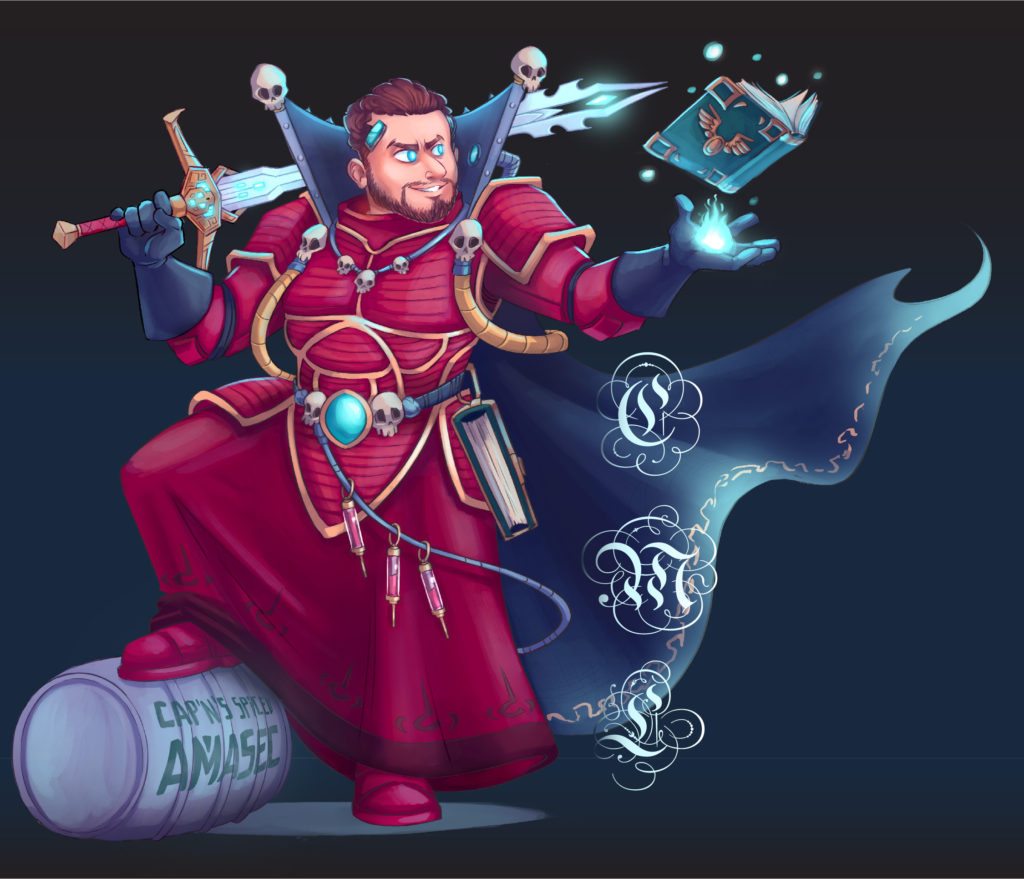
In an effort to take this project of mine a bit more seriously, I decided to invest in some imagery for it. The result is this image, which is the culmination of the persona I’ve crafted (and been given) over the years I’ve been putting 40K content out into the noosphere. The Amasec barrel was my wife’s idea, and bless her for being patient and working with me on my ideas. I worked with a wonderful artist, Johanna, to bring this concept to life. Check out her website at johannamation.com
This is the second project I’ve commissioned from her, and I’ve been happy with each one.
An Ongoing Conversation
I’d like to apologize to and thank everyone who waited for this article. Without getting too personal, a host of life-changing events and circumstances have taken up much of my writing and personal time/energy since January, and that was before the COVID-19 lockdown started. The lockdown only made things worse. While I aspire to writing more regularly, I also don’t want to rush out something that I haven’t put the right amount of time into, so I beg your patience as I continue to muddle my way through these topics.
If you found this interesting, please check out my page Captain Morgan’s Librarius. This is the space where I test these ideas in their first drafts, and also talk about all the other parts of the hobby that I enjoy from painting, community, gaming, and all the rest. It’s also the best place to converse with me about this and many other topics in 40K. Likes and shares are appreciated. I hope you enjoyed this week’s read, and I’ll see you again next time!
And remember, Frontline Gaming sells gaming products at a discount, every day in their webcart!

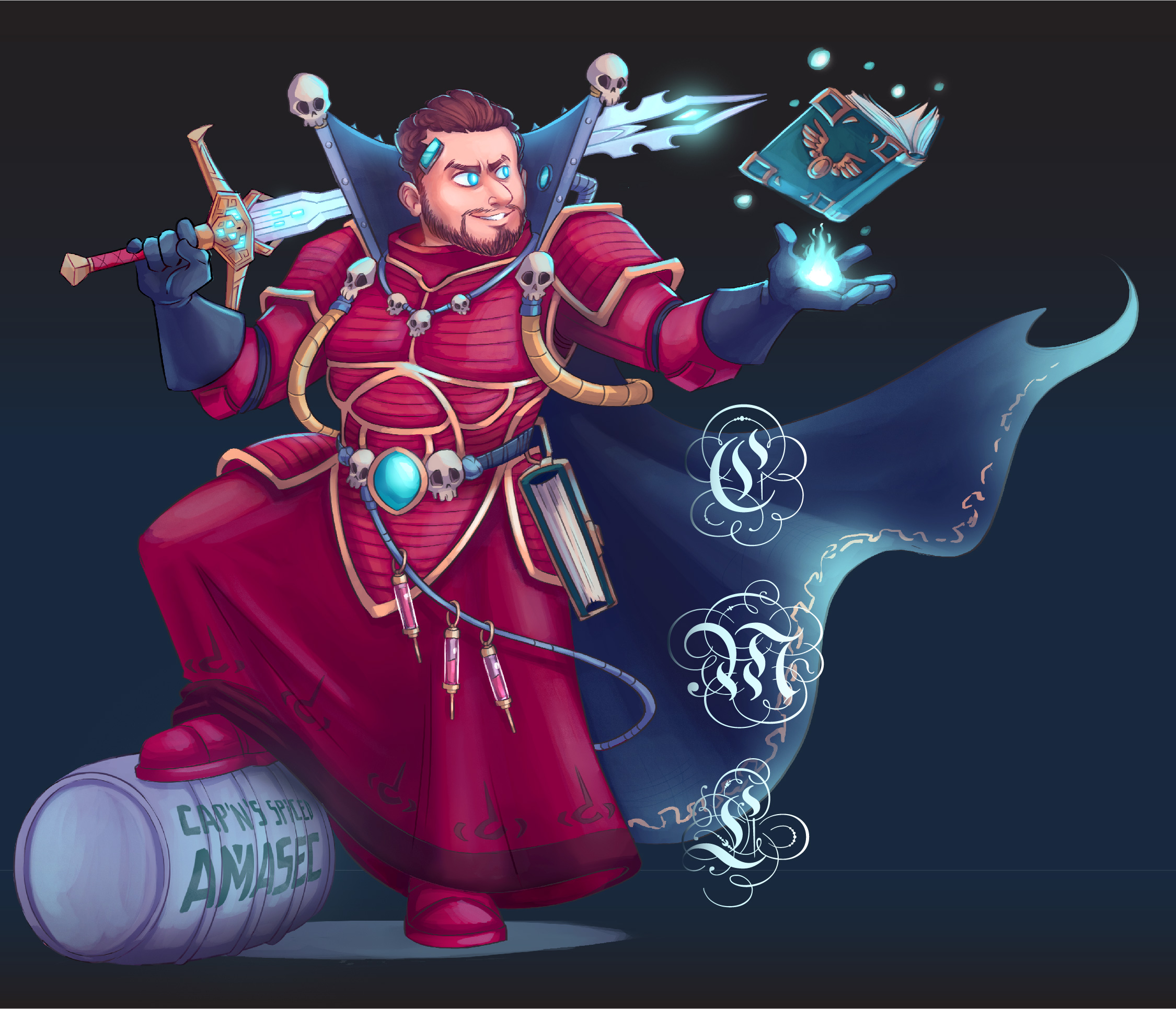


Nice article. I need to go back and read pt.1. I was wondering if you had read Asimov’s Foundation or Gibbon’s Decline and Fall?
I have read foundation trilogy, though I think he made a fourth one. Super interesting and … literally made tech priests .I’ll have to pick up Gibbbon’s book if its any good?
I haven’t, though I’m familiar with Azimov somewhat. Would you recommend them?
Hi, I just want to say that I’m loving these articles! 40k is a huge and diverse universe, its a real literary experience and whilst a lot of it is indeed fictive, so mucho f it also draws from our own human literary archive. Analysing these concepts in a universe that we have fallen in love with is an exercise that I cannot agree with more.
Keep it up <3
I so enjoy these articles. They are a great touch point on aspects not normally covered on FLGN. Don’t get me wrong , I love Grognard too but these are great. IDK if this is the area ” in the sense of the reply comments section”, to host a great thought provoking debate but looking at human history and the rise and fall of empires I think the Emps was the best option for the human race.
I say this because the fall in line or go to the dead pile is normally the most expedient way to accomplish human goals and where most civilizations fail big E could have prevailed due to the aspect of his immortality. The never changing ruler means , never changing ideals ( hopefully if he is the perfect human theory) so no good ceaser bad ceaser change ups on death.
Chris you make excellent points and bringing in the art pieces is fantastic but you mention the Emperor rarely gets his point of view in stories. This is true but he DOES get it on occasion and what can be seen ( differing authors aside, and when you consider things like the Gospel it actually makes more sense that big E sounds slightly different in different stories but “looks” the same) is a man that has existed through early human history but still a man. One of his biggest mistakes was his self belief and this might be the flaw of the perfect human because if they themselves believe they are perfect and the rest of humanity does too than all choices they make must be correct… This is already proven to be flawed as big E is not omnipotent. He is close but not 100%, stories like ” The Last Church”, “False Gods”, “1000 Sons”, and sorry I can’t recall the exact title but its one of the shorts featuring Pious and the “The First Blade”, where Big E kills like the first Chaos champ back in Crusade times or something and sees the first blade is is like, ” WTF MATE ! Imma bury this thing bc IDK what this is but I know its bad”. Anyway this goes to show he obviously can make mistakes so is not “perfect”. ( Yes you could make an argument that it wall all part of the long game like in , “Mechanicum” but if you go that route then you have to consider he wanted to get stuck on the golden chair and all that which… seems unlikely and offers no argument for any deep thought because no matter what you can just say , ” its the will of the Emperor” and be like any mindless imperial servant.
To get back to the sad fact that mass murder is the easiest choice , look at it from the 100% logic point of view, you have 50 people , 25 agree , 25 disagree and to pass a law you need 100% yes votes. the 25 no people are killed. You now have 100% yes people left and 100% vote. I realize this is SUPER simplified but it gets the basic point across and can clearly be seen not only throughout history as attempted but was successful until stopped, WW 2 etc .
With THAT point being made going back to Nietzsche, he claims the people not ready. “The people” at least imo being hopefully a majority but it seems he might be suggesting to all people accepting the fact God is dead . The quandary is the bearer of the news leaves because the people have not accepted the fact and .. lets be honest there are few simple things the entire human race can agree on let alone complex concepts like this. It may never happen… ever.This is where most western philosophers, again imo, fall short, they offer the path to an enlightened ideal but that is it. Basically, they put the fishing pole in front of the starving guy and a book on how to catch fish but they don’t force the guy to fish and sadly all of history shows that sure if its a great idea you could have 99 people pick up the book and pole and start fishing but there will be that one guy who grabs a rock and bashing the other guys brains out for his fish.
Sorry for the long winded post, my point here at the end of all that rambling is so long as someone can pick up a rock and survive by a different way of life , that wonderful dream of a global human race agreeing to move onto a new path to enlightenment and progress will be just a dream. Which the good vs evil argument of perspective can be put into a terrible thought dilemma .
IF every person did agree universally what is good and what is bad and there were no other options than anyone not good must be bad . This seems to be the simple view of the Emperor. OF course its his version of good but taken to its conclusion , would not the galaxy have been populated only by “good humans” if he fulfilled his quest? That is my question for you all, (anyone that stuck around on my points lol) if all the galaxy is indeed purged and chaos quelled etc, all thats left is the man with the book on how to fish and the fishing pole , the good man. (Excluding Tyranids coming eventually but if they did and the galaxy was united would they really stand a chance? Sorry another topic for another day) Since free thought is still a thing in 40k would not the man with a rock eventually come back? The Bad man.If he does how would he be stopped? Through peaceful negotiations?or a legion of enhanced killing machines? Which is the “good” moral choice and is there one if based on the argument of universal atheism and perspective, 99.99% of the good fisherman agree they need to kill the rock man, so they must be good.
Monstrous
This aspect is one of the things I think was reasonably well done in the Horus Heresy series. The tricky part is not about good or evil. It’s necessity.
The Emperor seeks to protect mankind and sees the Unification of Terra as the first step. Well okay, but how do you do that? One of the simple realities of the universe (any universe) is that ultimately might is right. So Big E creates the Thunder Warriors, and uses them to unify Terra. During this process innocents undoubtedly died. But would more have died had Big E abandoned his ambition and become a hermit? In order for the Emperor to achieve his objective it was necessary to wage war – so he did.
Another example – the Luna Wolves bringing Horus back to the flagship after being wounded by an athaeme. On arrival they were mobbed by humans wanting to know if Horus was okay. The Luna Wolves smashed through them (killing many) in order to get Horus to the infirmary before he died. Did they do that because it was good, or evil? No, they did it because they believed it was necessary. Would they be morally superior had they stood aside and had Horus bleed out on the hanger deck? (in hindsight maybe yes – but they weren’t to know this at the time).
But what about the whole taking trophies/skulls etc that Chaos Space Marines do so often? How could that be anything other than pure evil? Here’s the thing – this happened before any “corruption”. Look at the society that those Marines are recruited from – often deathworlds, hive gangs etc etc. In those cultures the strong survive and the weak perish. Is there any Legion that is accommodating to weakness? Loyalist or Traitor, every Legion prizes strength and skill. Displaying trophies of defeated enemies is good for showing strength – which intimidates potential enemies, so you can avoid fights and stay alive. It is also very good for the morale of your tribe/culture/Legion. It has purpose, and benefits, so it is necessary. Now when the Legions turned Traitor there was a lot of internal fighting/culling. Again, the strong and the loyal survive, while the “weak” and the “moral” get to be the first wave at Isstvan III. Post that the rules just get ramped up – in order to not be a victim, you show strength. To show strength, you display trophies that show you are strong.
From their point of view, the horror they inflict is necessary. Of course, if you are a World Eater, it’s also fun.
It’s much the same across the wider Imperium. If one person touched by Chaos can spawn a daemonic invasion that kills a world, is it not necessary to find those people and eliminate them? That’s the rationale of the Inquisition. Are they really all that wrong?
Good vs Evil, that’s easy. But through Necessity in there and it gets very murky, very quickly.
Bit late to the party, but anyway, my two cents on morality.
I see at least two axis to take into account when discussing morality:
Objective-Subjective
Absolute-Relative
At least that’s how I’d label them, for lack of better terms. And please note that often, relative morality or moral relativism would actually mean subjective morality when working within these terms. Despite that, this is the best way I can think of to properly represent morality without adding D&D alignments and blue and orange morality into the mix (though that would actually be on a lower level than these two axis, with the ge-lc-bo 3D morality being an individual framework set at a specific point in the meta-morality of os-ar).
Objective and Subjective is the question weather morality is independent from ones personal standpoint or if it is a matter of perspective and opinion, weather there is or can be an objective metric or framework with which we can evaluate the morality of any given action or if it is arbitrary.
One special note here: a moral bestowed upon humanity by some sort of higher being might just be a subjective moral framework disguised as objective morality, the same Might makes Right philosophy Nietzsches Will to Power has been twisted to elevated to a scale that. At the very least, we as mortals would probably not be able to determine if it is a moral framework that is somehow intrinsic to the universe or just the opinion of the divine being in question.
On the other hand, I have seen definitions that allow for objective morality without the need of a divine being by defining a suitable metric.
Absolute and Relative, to me at least, boils down to the question if the morality of a certain action is independent from or has to be evaluated in its context.
Is killing another person equally wrong no matter the circumstances? If so, someone that defends himself and his family with excessive force would be as evil as someone that kills for money.
On the other side, is giving money and food to homeless people always a good thing? It may help them for the moment, but it might also enable them in a potentially self-destructive lifestyle.
Then there is the term amoral you used a few times, which I understand as the absence of morality, in contrast to both blue and orange morals (as in a moral framework outside our understanding) and immoral (as in morally wrong or evil).
Where does that leave us in the context of 40k?
I would argue that the Chaos gods are amoral agents (funnily enough, I have more problems with seeing them as actual agents and less with seeing them as amoral as opposed to immoral) or at best subscribe to some form of blue and orange morals we can’t comprehend (if they do, I’d argue they’d very much be subjective and relative, as they depend on the whims of the gods).
Many of the followers of chaos act immoral, justifying their actions by prescribing a morality on the Chaos Gods as well as the emperor that fit their desires.
On the other side there’s the Emperor. I’d argue that he follows some form of blue and orange morals (as opposed to being amoral) that may very well be both absolute and objective, for all we know.
Since we don’t actually get anything from his perspective, we can only infer by context.
There are at least two reasons why he failed in the end just from the moral perspective:
-He tried to impress a moral framework on the Imperium that he probably didn’t fully understand himself, as for all his capabilities, he’s probably as incapable to understand good and evil as we are incapable to understand his moral framework
-He tried to impress this moral framework as objective and absolute onto human beings while at the same time taking away any justification for it to stick (by denying his divinity, which seems to be one of the easiest ways for people to buy into a moral framework being these two things, even in the face of logical contradictions), probably because in his moral framework, divinity is in some way immoral
One thing I assume you will discuss in future articles are the tragic characters of the settings, especially on the Chaos side.
Magnus, who set out with good intentions, managed to break these good aspects off himself and in the end decides to embrace the evil the loyalists prescribe onto him.
Mortarion, who know full well of the evil of chaos (though probably not by name) and was tricked into the heresy to the point of no return.
Imagine what would have happened if the Emperor had only revealed his plans to these two alone.
Night Haunter, our end-justifies-the-means Thomas Wayne Batman without the no killing rule gone off the deep end.
I imagine he started out with good intentions at some point. Being driven insane by visions of his death at the behest of the Emperor without really understanding that that is a result of his actions sounds like a really unpleasant fate.
Even Horus, it’s almost ironic how the visions he was shown during his vision quest were the exact future his actions would create. He should have realized he was on the wrong side when there were statues of Sanguinius though, so maybe leave him as a footnote.
I love your response here. It’s given me a lot to think about. I agree with your analysis on the Emperor’s motivations (as much as we can without seeing his perspective, which will Thanks for taking the time! I do plan on talking about some of the chaos-aligned primarchs in detail – specifically Magnus and Curze – in later installments in the series or as part of a new one. There are plenty with symbolic and psychological significance to choose from.